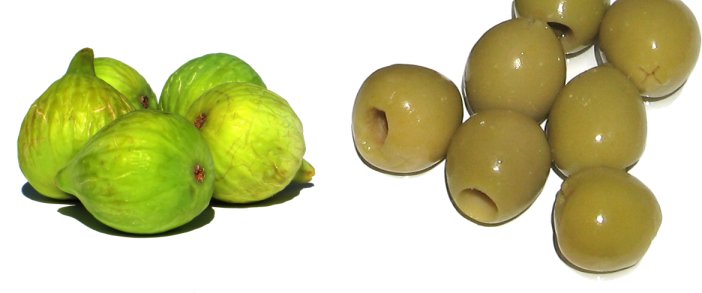This is post #28 in our series on Tafseer of Juz ‘Amma (click the link to see all posts in this series).

Allah says, in Surah At-Teen:
وَالتِّينِ وَالزَّيْتُونِ
وَطُورِ سِينِينَ
وَهَذَا الْبَلَدِ الْأَمِينِ
Translation: By the fig and the olive. And [by] Mount SinaiAnd [by] this secure city [Makkah], … [Surah At-Tin, verses 1-3]
Allah is testifying. Allah, the Lord of the Universe, wants us to take something extra-extra-super-specially-important. We should always ask, ya Rabbi, why are you testifying?
As we mentioned before, testifications show the immensity and greatness of the thing testified by. Insha’Allah you will find lots of benefits in olilves (and olive oil), and in figs (possibly even the dried ones).
And beware, there are a lot of fabricated ahadith about the benefits of this or that. Like “if you eat eggplant, you’ll be untouched by Hellfire.” Who fabricated them? Eggplant farmers! (And other merchants of specific foods.)
Toori-Sineen, refers to Mount Sinai–the place where Musa (alayhi salaam) spoke to Allah. A very blessed place–just like “this city (Mekka),” also known in Arabic as Makkah Al-Mukarramah, or “the noble city.”
The maqsoom ‘alayh (thing testified to) is:
لَقَدْ خَلَقْنَا الْإِنسَانَ فِي أَحْسَنِ تَقْوِيمٍ
Translation: We have certainly created man in the best of stature; [Surah Tin, verse 4]
That is, that humans are the best and most beautiful shape; we stand upright; we have opposable thumbs; and we lower our heads in submission to Allah.
One of the four great imams (I believe it was Imam Ash-Shafi’ee), rahimahullah, was once asked: “I told my wife, you’re divorced if you’re not more beautiful than the moon!” (Arabs considered the moon very beautiful.) “So am I divorced?”
Imam Ash-Shafiee thought about it, and said, “no … because your wife is more beautiful than the moon!” And the guy got angry and was ready to punch him out, like “have you been looking at my wife?!” kinda thing.
And the imam, rahimahullah, quoted this ayah–that we created humans in the BEST of forms. Subhanallah!
But there’s a catch! Allah continues:
ثُمَّ رَدَدْنَاهُ أَسْفَلَ سَافِلِينَ
Translation: Then We return him to the lowest of the low, [verse 5]
This meaning is similar to Surah Al-Asr–that “all humans are in loss,” by default, it’s like a water-slide; you just let go and let the dunya take you, and by default, you lose.
Then Allah spells out the recipe for success, how to be exceptional from this group of losers:
إِلَّا الَّذِينَ آمَنُوا وَعَمِلُوا الصَّالِحَاتِ فَلَهُمْ أَجْرٌ غَيْرُ مَمْنُونٍ
Translation: Except for those who believe and do righteous deeds, for they will have a reward uninterrupted. [verse 6]
Again, similar meaning to Surah Al-‘Asr.
Then the final two verses:
فَمَا يُكَذِّبُكَ بَعْدُ بِالدِّينِ
أَلَيْسَ اللَّهُ بِأَحْكَمِ الْحَاكِمِينَ
Translation: So what yet causes you to deny the Recompense? Is not Allah the most just of judges? [verses 7-8]
The recompense means, the Day of Judgment, and the Hisaab–the final recompensation for every little thing that you did, good or bad. And we’ll discuss the final verse in the grammar, insha’Allah.
Wallahu ta’ala ‘alam. Insha’Allah we’ll post a subsequent post on the Arabic grammar, to try and keep each post short, insha’Allah.
Action Items: What else do you know from the tafseer of Surah At-Teen? Post a comment insha’Allah and share it with us!
References:
- Touched by an Angel: Tafseer of Juz ‘Amma. By Muhammad Alshareef. 2009.